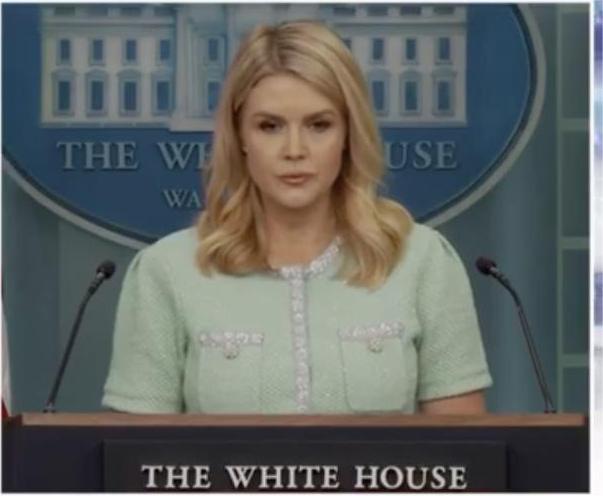
On March 11, 2025, a heated debate over US President Trump's tariff policy broke out at the White House press conference, with the main characters being White House Press Secretary Leavitt and Associated Press reporter Bock. This debate not only revealed the complexity of the Trump administration's trade policy but also once again highlighted the tense relationship between the media and the government.
The cause of the dispute was a sharp question from Bock regarding Trump's tariff policy. Bock pointed out that during his presidential campaign, Trump had vigorously promoted tax reduction policies, but now he was proposing to increase taxes in the form of tariffs. He questioned, "Why would Trump now prioritize the latter?" This question directly touched upon the core of the Trump administration's trade policy and also reflected the public's general concern about the consistency of government policies.
In response to Bock's question, Levitt quickly responded. She insisted that Trump had not implemented tax increases but was trying to correct unfair trade practices through tariffs. She explained, "Tariffs are a tax increase for those countries that take advantage of us, but a tax cut for Americans." To support this view, Levitt also listed the tip, overtime, and social security benefit tax exemption policies proposed by Trump during his campaign, attempting to prove that Trump remains a staunch advocate of tax cuts.
However, Bock was not convinced. He retorted, "Sorry, have you paid the tariffs? Because I have. Foreigners don't pay tariffs; it's the importers who have to pay them." This rebuttal directly pointed out a key issue with the tariff policy: although tariffs can theoretically increase government revenue, in practice, these costs are often passed on to importers and consumers, thereby increasing their economic burden.
Levitt did not give up. She continued to explain that when the United States has fair and balanced trade, tax revenue will remain stable, wages will rise, and the United States will become prosperous again. However, Bock's question clearly touched upon the core of this debate: Can Trump's tariff policy really achieve these goals? Or does it merely intensify trade tensions and increase economic uncertainty?
At the height of the controversy, Levitt even expressed regret at allowing the Associated Press to ask questions. This statement undoubtedly exacerbated the tension between the media and the government. As a global news agency that disseminates news worldwide, the Associated Press plays a pivotal role in reporting on international political and economic news. Levitt's remarks undoubtedly questioned the professionalism and impartiality of the Associated Press and challenged the fundamental function of the media in supervising the power of the government.
In fact, this dispute is merely a microcosm of the controversies surrounding the Trump administration's trade policies. Since taking office, Trump has frequently employed tariffs as the primary tool of his trade policy. From steel and aluminum tariffs to reciprocal tariffs, Trump's tariff policies have not only sparked disputes with multiple trading partners but also had a profound impact on the US economy.
Trump's tariff policies were aimed at reducing the US trade deficit, promoting the return of manufacturing jobs, and creating more employment opportunities. However, these policies have also brought about many side effects. First, tariffs have increased the cost of imported goods, thereby pushing up consumer price levels. Second, tariffs have triggered retaliatory tariff measures from trading partners, further intensifying trade tensions. Finally, the uncertainty of tariff policies has also increased the risks for business investment and consumer spending, thereby having a negative impact on economic growth.
In this debate, Bock's questions undoubtedly touched upon these key issues. He questioned the coherence and effectiveness of Trump's tariff policies and also pointed out their potential negative impacts on the economy and society. While Levitt's response attempted to defend Trump's policies, emphasizing the necessity of correcting unfair trade practices, regardless of their positions, this debate revealed the complexity and controversy of the Trump administration's trade policies.
Furthermore, this controversy once again highlights the tense relationship between the media and the government. As the fourth power, the media plays a crucial role in supervising government power and conveying the public voice. However, during the Trump administration, conflicts and frictions between the media and the government occurred frequently. From Trump's frequent accusations of "fake news" to the government's restrictions and suppression of the media, these actions undoubtedly undermined the media's independence and impartiality and posed a threat to the healthy development of the democratic system.
In conclusion, the tariff policy dispute between the White House press secretary and the Associated Press reporter not only reveals the complexity and controversy of the Trump administration's trade policy, but also once again highlights the tense relationship between the media and the government. In the days to come, we hope that the government can communicate and cooperate with the media in a more open and transparent manner to jointly promote the healthy development of society and the continuous improvement of the democratic system. At the same time, we also hope that the media can continue to play its important role in supervising government power and conveying the voices of the public, and contribute its own strength to the progress and development of society.

Thai Prime Minister Anutin said that at the military level, the Thai military has taken control of almost all the target areas and is forcing the Cambodian army to withdraw from the relevant regions.
Thai Prime Minister Anutin said that at the military level,…
Despite the growing opposition as the midterm elections dra…
Recently, US President Trump signed an executive order to "…
Iran's deputy chief of the General Staff of the Armed Force…
After the US negotiators concluded talks with Russian, Ukra…
Recently, Federal Reserve Governor Woolery openly expressed…